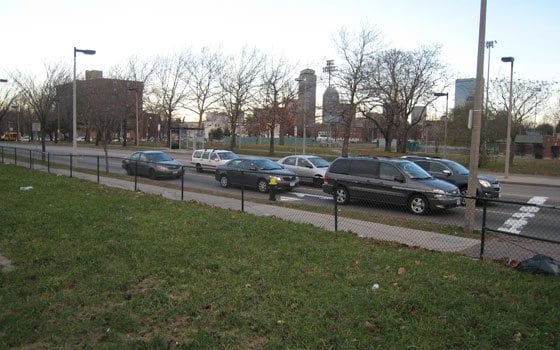
Four developer teams hoping to breathe life into Parcels 9 and 10 near Dudley Square appeared for the second time before the Project Review Committee (PRC) at a recent public meeting.
The long-vacant parcels lie on Washington Street at Melnea Cass Boulevard: Parcel 9, on the north side of the boulevard, is a vacant rectangle abutting Jim Rice Field; Parcel 10, across the street, shares the block with Tropical Foods (2101 Washington St.) and now contains an open patch of grass and a parking lot.
The teams recapped their proposals — first unveiled on Nov. 3 — for residential and commercial development of the parcels, and responded to an extensive list of questions compiled by the PRC. The 15 committee members will decide soon which proposal or proposals to recommend to the Roxbury Strategic Master Plan Oversight Committee (RSMPOC).
“Basically, the underlying question is, ‘For whom?’ ” said PRC co-chair Jorge Martinez. “Jobs for whom? Housing for whom? What segment of the population will benefit?”
The committee has to evaluate the proposals in light of the goals and requirements in the Request for Proposals (RFP) issued last July by the Boston Redevelopment Authority (BRA) and the Roxbury Strategic Master Plan devised in the 1990s and 2000s by the BRA and the local community. These documents emphasize economic development, job creation and wealth creation for the Roxbury community as key goals.
Martinez, who is also an RSMPOC member and executive director of Project RIGHT, a Grove Hall neighborhood and economic development organization, spoke by telephone after the meeting about the challenges of vetting the four proposals.
“It’s about how people feel about affordable housing, ‘work force housing’ and market rate,” he explained. “The community is slowly but clearly being gentrified. We have to make a recommendation that’s in the community’s best interest.
“It’s a hard subject,” he continued, “given that one goal is to uplift the community and build capacity and individual wealth. That means different things to different people, and we all have to come to an understanding within our group of what those things mean.”
Each developer team had only a brief time to present. Speakers sought to differentiate their projects and highlight unique project features or developer ties to the community.
The largest proposal is “Washington Crossing,” encompassing Parcels 9 and 10 together. The plan includes a new Tropical Foods store as well as offices, retail and 141 “work force” rate apartments for moderate-income workers such as teachers and firefighters. Commercial space would be marketed to educational and academic institutions looking for research and satellite office space.
Dan Rivers, managing partner at Essential Capital and a partner in the large Washington Crossing project team, emphasized the wealth-building aspects of their proposal.
“If you don’t have a job you can’t live in a house,” he said. “We’re trying to create an opportunity for people to have jobs with a livable wage.” He described a proposed equity investment program that would allow local residents to invest small amounts in the project and see returns as the development comes to fruition. “Our plan is to maximize financial opportunity for everyone, not just for the retailers coming in,” he said. “Every single person in this room can benefit from the appreciation and growth of the community.”
The PRC’s detailed question list, given in advance to the teams, covered project financing; proportion of affordable vs. market rate housing; types of permanent jobs created and how the jobs will provide a “career ladder” for local residents; types of retail the project will likely include; project phasing; how the project uses will enliven the area without detracting from existing Dudley Square enterprises; environmental sustainability features; and whether the project will require zoning variances.
In the public meetings it has become clear that some developers and members of the public believe affordable housing is an important priority in new development, while others take an “enough is enough” position, pointing out that Roxbury already has the highest percentage of affordable housing of any city neighborhood, and doesn’t need more.
The PRC will have to solidify its position on that issue and many other details. In addition to the proposal presentations, they are poring over documents on financing, environmental sustainability, and local and minority hiring plans. At least one team, the Melnea Group, said they had submitted detailed written responses to the PRC’s list of questions.
The process is complicated and often difficult, Martinez said, but also remarkably inspiring. In addition to a satisfying level of discussion and debate, he has been impressed with the caliber and racial and ethnic diversity of the development teams.
“The diversity and the expertise is amazing,” he said. “To look around the room at the partnerships in those four groups — it’s quite impressive. It shows how upwardly mobile we’re becoming in our communities of color. It’s been great to hear our brothers and sisters, and a pleasure to be on the cutting edge of this decision.”
The PRC had been scheduled to vote at a Dec. 20 meeting, but that meeting was postponed to give committee members more time to evaluate the data.
The date for the vote is now unscheduled, but the PRC’s next working session, open to the public, is scheduled for Jan. 9.
The process cannot be rushed, according to Martinez.
“We’re moving through as quickly as we can,” he said, “but as slow as we need to, so at the end of the day we make a decision by consensus — a good decision for the community.”
For links to the Parcels 9 and 10 proposals and the Roxbury Strategic Master Plan, see the Melnea Cass Blvd. project website (www.cityofboston.gov/transportation/melnea/). To view the Request for Proposals, search for “Parcel 9” at the BRA website (www.bostonredevelopmentauthority.org).






